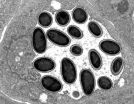INFORMATION:
Findings from the study were published as part of the proceedings of the American Society for Microbiology 2014 meeting in Boston.
Funding was provided by the RIT College of Science Dean's Research Initiation Grant and Monash University Malaysia.
'Grapes of Wrath': Stomping out grape disease one vineyard at a time
Genetic profile of grape crown gall disease could increase crop production
2014-10-14
(Press-News.org) Cracking the genetic code of a common disease affecting grape production could improve vineyard management and help protect the multibillion-dollar industry that includes raisins, juice, jam/jelly, fresh grapes, grape-seed extract and oil, vinegar and wine.
A Rochester Institute of Technology scientist and an RIT alumnus are close to completing the genetic blueprint, or microbiome, of grape crown gall tumor disease—the bane of vineyards worldwide. Their study focuses on 16 grape varieties, including Cabernet Sauvignon and Riesling, from vineyards in the New York Finger Lakes Region, Cornell University's New York State Agricultural Experiment Station in Geneva, N.Y., and Missouri. Grape varieties Muscat Ottonel, Vitroblack and Muscat of Alexandria were also sampled from vineyards in Hungary, Tunisia and Japan, respectively.
According to the Congressional Wine Caucus, a coalition of U.S. representatives and senators, the U.S. wine, grape and grape products industries yielded more than $162 billion annually to the U.S. economy in 2007. More recently, in February, the New York Wine and Grape Foundation reported a $4.8 billion economic impact on New York state, based on 2012 data.
"We are about six months away from having the data to completely describe the bacterial microbiome of grapevine tumors," said Michael Savka, professor of biological sciences in the Thomas H. Gosnell School of Life Sciences at RIT, and organizer and contributor of the international study. "By understanding the microbial composition of the diseased state on and in the grapevine crown gall tumor, we can begin to formulate informed biological control treatments—better mixtures of protective bacterial species—to reduce the infection that leads to the development of crown gall tumors in vineyards."
The total environmental DNA of grape crown gall tumor disease is revealed in the genetic profile based on 52 tissue samples of crown gall tumor taken from 16 grapevine species. The infected grape species were grown in five geographical locations and on four different continents, including North America, Europe, Africa and Asia. A complete ecological understanding of the microbial population associated with Agrobacterium vitis could improve disease management and crop production of all varieties of grapes, Savka said.
Grape crown gall is a chronic disease that lacks effective treatment and is difficult to eradicate. Bacteria enter the vine through grafts or wounds and spread through the plant's vascular tissue. The systemic infection develops into swollen knots, or galls, that starve the plant of water and nutrients necessary for proper growth and development. The sometimes-latent disease can kill vineyards, stress mature vines and persist in soil and in decaying plant matter for years.
Central to the study are the contributions of Savka's collaborator and former student, Han Ming Gan, research fellow at Monash University Malaysia and a 2008 RIT biotechnology alumnus. Gan, an expert in next-generation DNA sequencing platforms, developed a technical approach that separates DNA of bacteria from close relatives in the archaea—a group of single-celled microorganisms—from plant cell DNA. He identified a core microbiome common to all 52 sampled tumors that consists of three different species of Agrobacterium, one species of Erwinia and Novosphingbium, and one member from Enterobacteriaceae and Microbacteriaceae.
"Now that we have defined the core microbiome of crown gall tumor, the next step would be to predict the role the other non-Agrobacterium strains in the crown gall based on their identity," Gan said.
The team is also assessing whether differences exist in climate, grape cultivar and in tumor type. Additional samples have been collected this year in Hungary and Tunisia, Savka noted.
ELSE PRESS RELEASES FROM THIS DATE:
Brand loyalty: What happens when our favorite products are unavailable?
2014-10-14
What would happen to all those millions of Snickers fans if their favorite chocolate bar was temporarily out of stock? Would they wait for it to be available again or would they quickly switch allegiance to Milky Way or Kit Kat? According to a new study in the Journal of Consumer Research, when you can't get your favorite product, you'll quickly forget about it if you can find a good replacement.
"We studied situations in which products are temporarily unavailable. We found that desire for a product depends on the amount of time that has passed since a consumer was able ...
New treatment target identified for aggressive breast cancer
2014-10-14
AUGUSTA, Ga. – One of the first-known oncogenes has a protein partner that helps breast cancer proliferate and when it's blocked, so is the cancer, scientists report.
The gene ErbB2, commonly called HER2, is highly expressed in about 25 percent of breast cancers. Scientists have now found the protein Erbin, thought to be an anti-tumor factor, also is highly expressed in these cancers and essential to ErbB2's support of breast cancer.
When scientists interfere with the interaction between the two in mice, it inhibits tumor development and the usual spread to the ...
Forced to be bad: When eating that chocolate cake is 'not our fault'?
2014-10-14
Imagine you're dining out with a friend who insists on sharing some chocolate cake for dessert. Since the decision has already been made for you, you gladly join in without feeling any regret. According to a new study in the Journal of Consumer Research, consumers are happier when someone else decides they can indulge in dessert or other guilty pleasures.
"Most of us don't like being forced to do things. The freedom to make our own decisions generally energizes us and increases our sense of well-being. However, when it comes to purchasing and consuming products normally ...
Country of origin: Are negative stereotypes always bad for business?
2014-10-14
Consumers worldwide associate France with fashion and luxury and are willing to pay a lot for French luxury products such as perfume and wine. But what about products made in countries with less favorable reputations? A new study in the Journal of Consumer Research shows that consumers won't judge a country's products by its reputation if the products are well-made.
"Positive feelings about a country don't always translate into more favorable opinions of its products. A positive opinion of a country may actually make consumers think more about whether or not the country ...
Parents' perception of teens' experiences are related to mental health
2014-10-14
October 14, 2014 –Adolescents whose parents better understand their daily experiences have better psychological adjustment, suggests a study in the October issue of Psychosomatic Medicine: Journal of Biobehavioral Medicine, the official journal of the American Psychosomatic Society. The journal is published by Lippincott Williams & Wilkins, a part of Wolters Kluwer Health.
Having parents who understand how their day went may even affect teens' cellular responses to stress—providing a possible link to improved physical health as well. "These results provide ...
Diet and exercise during pregnancy has hidden benefits
2014-10-14
It might not be obvious on the scales, but healthy eating and increased physical activity from walking during pregnancy is directly associated with a range of improved outcomes at birth, according to researchers from the University of Adelaide.
Results of the world's biggest study of its kind – offering healthy eating and exercise advice to pregnant women who are overweight or obese – are published today in two papers in the journal BMC Medicine.
"While it might have been expected that healthier eating and increased physical activity during pregnancy would ...
Study: Only 58 percent of votes cast on tamper-resistant systems counted
2014-10-14
A Rice University study of tamper-resistant voting methods revealed that only 58 percent of ballots were successfully cast across three voting systems. The researchers concluded additional work is needed to make voting both secure and user-friendly.
The study, "Usability of Voter Verifiable, End-to-End Voting Systems: Baseline Data for Helios, Prêt à Voter and Scantegrity II," examined three new end-to-end voting systems – systems that give voters the option to both verify the system is working properly and to check that their votes have been recorded ...
Swiss scientists explain evolution of extreme parasites
2014-10-14
Extreme adaptations of species often cause such significant changes that their evolutionary history is difficult to reconstruct. Zoologists at the University of Basel in Switzerland have now discovered a new parasite species that represents the missing link between fungi and an extreme group of parasites. Researches are now able to understand for the first time the evolution of these parasites, causing disease in humans and animals. The study has been published in the latest issue of the scientific journal Proceedings of the National Academy of Sciences (PNAS).
Parasites ...
Spinal cord injury victims may benefit from stem cell transplantation studies
2014-10-14
Putnam Valley, NY. (Oct. 13, 2014) – Two studies recently published in Cell Transplantation reveal that cell transplantation may be an effective treatment for spinal cord injury (SCI), a major cause of disability and paralysis with no current restorative therapies.
Using laboratory rats modeled with SCI, researchers in Spain found in laboratory tests on cells harvested from rats - specifically ependymal progenitor cells (epSPCs), multipotent stem cells found in adult tissues surrounding the ependymal canal of the spinal cord - responded to a variety of compounds ...
Treating cancer: UI biologists find gene that could stop tumors in their tracks
2014-10-14
The dirt in your backyard may hold the key to isolating cancerous tumors and to potential new treatments for a host of cancers.
University of Iowa researchers have found a gene in a soil-dwelling amoeba that functions similarly to the main tumor-fighting gene found in humans, called PTEN.
When healthy, PTEN suppresses tumor growth in humans. But the gene is prone to mutate, allowing cancerous cells to multiply and form tumors. PTEN mutations are believed to be involved in 40 percent of breast cancer cases, up to 70 percent of prostate cancer cases, and nearly half of ...
LAST 30 PRESS RELEASES:
Ketamine high NOT related to treatment success for people with alcohol problems, study finds
1 in 6 Medicare beneficiaries depend on telehealth for key medical care
Maps can encourage home radon testing in the right settings
Exploring the link between hearing loss and cognitive decline
Machine learning tool can predict serious transplant complications months earlier
Prevalence of over-the-counter and prescription medication use in the US
US child mental health care need, unmet needs, and difficulty accessing services
Incidental rotator cuff abnormalities on magnetic resonance imaging
Sensing local fibers in pancreatic tumors, cancer cells ‘choose’ to either grow or tolerate treatment
Barriers to mental health care leave many children behind, new data cautions
Cancer and inflammation: immunologic interplay, translational advances, and clinical strategies
Bioactive polyphenolic compounds and in vitro anti-degenerative property-based pharmacological propensities of some promising germplasms of Amaranthus hypochondriacus L.
AI-powered companionship: PolyU interfaculty scholar harnesses music and empathetic speech in robots to combat loneliness
Antarctica sits above Earth’s strongest “gravity hole.” Now we know how it got that way
Haircare products made with botanicals protects strands, adds shine
Enhanced pulmonary nodule detection and classification using artificial intelligence on LIDC-IDRI data
Using NBA, study finds that pay differences among top performers can erode cooperation
Korea University, Stanford University, and IESGA launch Water Sustainability Index to combat ESG greenwashing
Molecular glue discovery: large scale instead of lucky strike
Insulin resistance predictor highlights cancer connection
Explaining next-generation solar cells
Slippery ions create a smoother path to blue energy
Magnetic resonance imaging opens the door to better treatments for underdiagnosed atypical Parkinsonisms
National poll finds gaps in community preparedness for teen cardiac emergencies
One strategy to block both drug-resistant bacteria and influenza: new broad-spectrum infection prevention approach validated
Survey: 3 in 4 skip physical therapy homework, stunting progress
College students who spend hours on social media are more likely to be lonely – national US study
Evidence behind intermittent fasting for weight loss fails to match hype
How AI tools like DeepSeek are transforming emotional and mental health care of Chinese youth
Study finds link between sugary drinks and anxiety in young people
[Press-News.org] 'Grapes of Wrath': Stomping out grape disease one vineyard at a timeGenetic profile of grape crown gall disease could increase crop production


